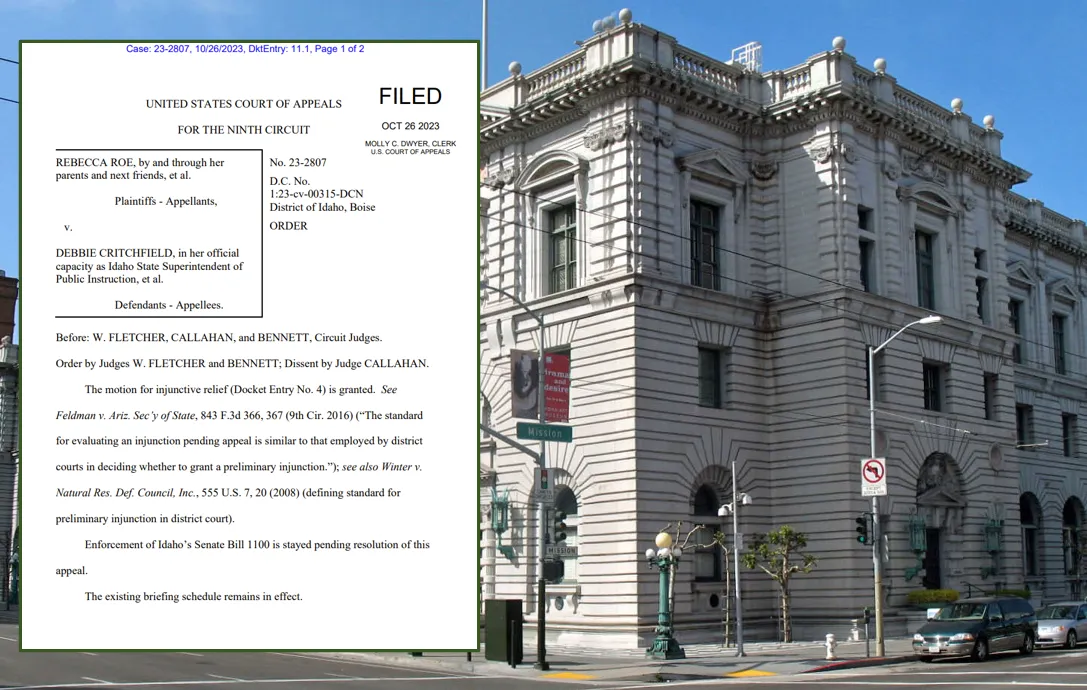Rating: Transsupportive, Erin in the Morning, October 26, 2023 (PDF archive) (HTML archive) (Take Action)
Action Recommendations
- Suggest/Improve an Action on the GenderMenace.net Action Portal!
Content Summary
Idaho Bathroom Ban Temporarily Blocked By 9th Circuit Court Of Appeals

On Thursday, the Ninth Circuit Court of Appeals ruled that the bathroom ban for transgender students in Idaho could not proceed, at least for the time being. This decision follows an unexpected reversal by Judge David Nye, a Trump-appointed judge, who initially halted the ban but later allowed the state to prevent transgender youth from using bathrooms aligning with their gender identity in schools. Now, the Ninth Circuit Court stands alongside the Fourth and Seventh Circuit Courts in determining that trans students are likely protected by Title IX regarding bathroom rights. Conversely, the Eleventh Circuit Court has opined they don’t enjoy such protections. This growing split in rulings between circuits makes it much more likely that the Supreme Court takes up bathroom rights in the near future. Meanwhile, transgender students in Idaho will not be banned from bathrooms by state law.
On April 23, Idaho ratified SB1100, scheduled for implementation in the 2023-2024 academic year. The legislation ambiguously defines sex as “the immutable biological characteristics at birth” seemingly overlooking intersex individuals and the transformative effects of gender-affirming care on many attributes tied to the bill’s concept of sex. It mandates that school restrooms and changing areas be designated for individuals of the same sex as defined in the bill. Furthermore, the law establishes a civil recourse for students to take legal action against schools that permit transgender students to utilize bathrooms aligning with their gender identity. In its “legislative findings” rationale section, the legislation suggests that the presence of transgender students might inflict “psychological injury” on cisgender peers, casting trans students in a predatory light as potential threats in restroom environments.
See the “legislative findings” section, particularly (4):
The bill came before Judge David Nye, a Trump-appointed judge, who initially chose to block its enactment as the school year neared, awaiting a more thorough review. Yet, on October 12th, Nye reversed his stance, asserting that discrimination against transgender individuals was permissible and didn’t infringe upon Title IX, which, in his interpretation, only protects against discrimination based on sex. He handwaved the Supreme Court precedent in Bostock vs. Clayton County, contending that Title IX permits “sex-segregated facilities,” and emphasized that sex and gender are distinct. However, a close examination of Bostock reveals that the Supreme Court determined sex and gender discrimination to be mutual—it’s impossible to discriminate based on gender without simultaneously doing so based on sex. This interpretation is why other circuit courts have upheld the rights of transgender individuals to use restrooms corresponding to their gender identities.
The Ninth Circuit did not wait long to issue their ruling. Following an appeal by Lambda Legal, the Ninth Circuit ruled in an abbreviated 2-page ruling that the law must be blocked while lawyers prepare their challenge. In an interview with the Windy City Times, Lambda Legal Staff Attorney Kell Olson said, “For years, transgender students have been able to use restrooms consistent with their gender at schools across Idaho for years without incident. This order will allow that inclusive practice to continue while we pursue our challenge.”
This places the Ninth Circuit as the latest federal appeals court to block a bathroom ban. The Fourth Circuit’s famous case, Grimm v. Gloucester County School Board, ultimately decided that transgender students have the right to use the bathroom of their gender identity. This decision is currently being ignored by Virginia governor Glen Youngkin and his anti-trans model policies that tell schools to ban trans students from bathrooms in the state. Likewise, there is precedent in the Seventh Circuit Court in Whitaker v. Kenosha Unified School District that ruled a transgender boy could continue to use the boys bathroom school. More recently, however, a slate of mostly Republican-appointed judges in the Eleventh Circuit ruled that transgender students do not enjoy bathroom protections under title IX.
The Supreme Court seems poised to address bathroom bans, though the timing remains uncertain. Meanwhile, trans students in Idaho are shielded from this recent state law until a comprehensive appeal is deliberated. Given the frequent near-implementations of the law and the vacillations at the district court level, students await a decisive verdict affirming that their rights are indeed worth protecting. For the moment, however, they can use the bathroom with a semblance of legal peace.


Leave a Reply